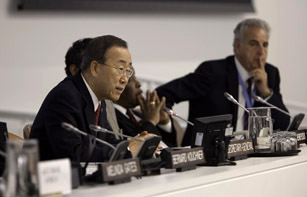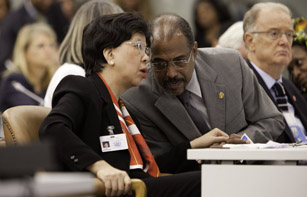
UN Secretary-General Ban Ki-moon speaking at Global Fund Champions for Global Health session at UN MDG Summit 2010, New York. Credit: UNAIDS/Hamilton
On Tuesday 21st September, the Global Fund to Fight AIDS, Tuberculosis and Malaria organized an event entitled “Champions for Global Health - Financing the health related MDGs”. The meeting aimed at raising awareness among world leaders attending the MDG Summit as to the linkage between a fully-funded Global Fund and the achievement of the health related MDGs.
Meeting participants included Ministers from donor and recipient countries, leaders from the private sector, foundations, faith-based and international organizations.
“The Global Fund has emerged as the 21st century’s most powerful channel for health financing,” said UNAIDS Executive Director Michel Sidibé. “I am here to clearly demonstrate UNAIDS’ commitment to a fully funded Global Fund. However, the shared responsibility for ending the AIDS epidemic belongs to all of us—governments, civil society, the media, as well as committed individuals.”
2010 will be decisive for global health, because it is the year in which donor governments will commit funding to the Global Fund to cover programmes for 2011 to 2013. For that reason, the meeting provided a public platform for donor countries and private sector organizations to announce their pledges to the Global Fund in advance of its third replenishment meeting which will be held on 4 - 5 October in New York and will be chaired by the United Nations Secretary-General Ban Ki-moon.

Dr Margaret Chan, Director-General WHO and Michel Sidibé, UNAIDS Executive Director at the Global Fund Champions for Global Health session at UN MDG Summit 2010, New York. Credit: UNAIDS/Hamilton
It is estimated that nearly 2.8 million people are accessing treatment through funds provided by the Global Fund, more than half of the people on treatment today. However there are nearly 10 million people living with HIV who urgently need treatment. Five people are newly infected with HIV for every two people who newly access treatment.
New UNAIDS data show that new HIV infections have declined by more than 25% in 22 countries most affected by AIDS in sub-Saharan Africa. With nearly 5.2 million people on antiretroviral therapy, AIDS-related deaths have also fallen.
“Together, we can reach our goal if the Global Fund and its partners have enough resources to continue the dramatic progress that has been made in the response to AIDS in the past few years,” highlighted Mr Sidibé. He also noted that “If we are unable to provide the necessary resources, we could lose the tremendous gains we have made, and the inspiration and momentum for millions of people.”





